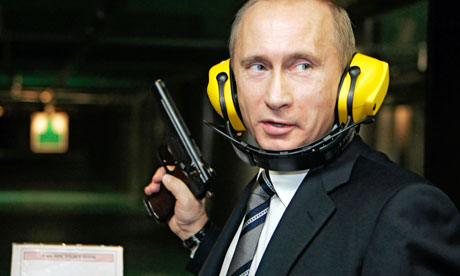 The Russian prime minister, Vladimir Putin, is used to receiving accolades in friendly nations, but even he may raise an eyebrow at the prize he has just been awarded in China: peacemaker of the year.
The Russian prime minister, Vladimir Putin, is used to receiving accolades in friendly nations, but even he may raise an eyebrow at the prize he has just been awarded in China: peacemaker of the year.After two wars in Chechnya, one conflict in South Ossetia and two of the deadliest hostage relief operations in modern history, the former KGB officer was named on Monday as the winner of the second Confucian peace prize.
It is unclear if Putin is even aware of the award which was chosen by an obscure cultural organisation, the China International Peace Research Centre, from a field of nominees including Bill Gates, Angela Merkel, Kofi Annan, Jacob Zuma and a Tibetan Panchen Lama imposed by Beijing.
The 16-judge panel said that Putin deserved the award because his criticism of Nato's military engagement in Libya was "outstanding in keeping world peace", regardless of the fact that it had no bearing on the outcome of the north African conflict.
The short history of the prize is as controversial as the choice of winner. The Chinese organisers claimed they established the award last year after preparing for years to create something that would "promote world peace from an eastern perspective".
But the Confucian peace prize appeared more like a rushed and botched attempt to upstage the Nobel laureate status granted to jailed Chinese dissident Liu Xiaobo.
The inaugural ceremony was widely ridiculed when the winner – former Taiwanese vice-president Lien Chan – failed to turn up. A schoolgirl appeared in his place to collect the 100,000 yuan (£9,500) cash prize.
This has not gone down well even with China's authorities. Two months ago, the ministry of culture distanced itself from the prize, disbanded the organisation behind it, and associated with another similarly named award.
Although these setbacks looked likely to mark the end of the group, the original organisers reformed in Hong Kong – which is not bound by the same rules as the mainland – and now plan to stage an award ceremony on 9 December, the day before the Nobel ceremony.
Origin
Source: Guardian
No comments:
Post a Comment